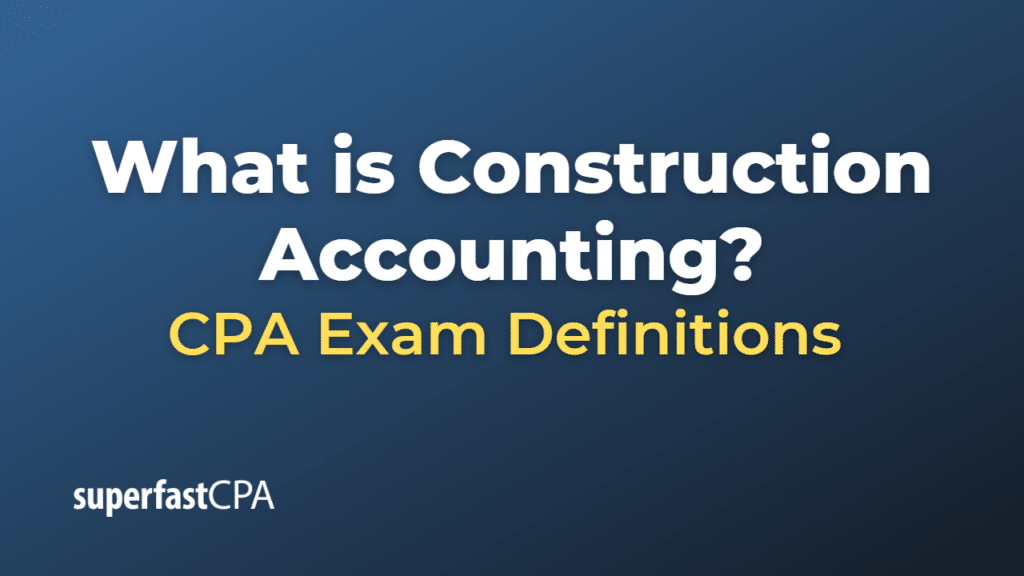Construction Accounting
Construction accounting is a specialized branch of accounting that deals with the unique financial management and reporting requirements of the construction industry. It is designed to address the specific challenges and complexities involved in managing construction projects, such as long project durations, multiple stakeholders, fluctuating costs, and revenue recognition.
Some key features and aspects of construction accounting include:
- Project accounting: Construction accounting focuses on tracking and managing the financial aspects of individual construction projects, rather than the overall financial performance of the entire company. This approach helps construction companies monitor the profitability and progress of each project and make informed decisions based on accurate, project-specific financial data.
- Job costing: Accurate job costing is crucial in construction accounting, as it helps companies allocate and track costs for specific projects or jobs. This includes direct costs, such as labor, materials, and equipment, as well as indirect costs, like overhead, insurance, and permits. Job costing enables construction companies to determine the profitability of each project and identify areas for improvement or cost control.
- Progress billing: Construction projects often span over several months or even years, with payments typically made in installments based on the completion of specific milestones or phases. Construction accounting involves progress billing, which is the process of invoicing clients according to the percentage of work completed or milestones reached. This ensures that cash flow is maintained throughout the project and helps companies avoid financial strain.
- Revenue recognition: Construction accounting follows specific revenue recognition rules that align with the progress of the project. The percentage-of-completion method is commonly used, where revenue is recognized based on the proportion of the project completed during the accounting period. This method helps to match revenues and expenses more accurately, providing a more realistic representation of a company’s financial performance.
- Contract management: Construction accounting also involves managing various contracts, including agreements with clients, subcontractors, suppliers, and other stakeholders. Effective contract management is essential to ensure that all parties fulfill their obligations, and any changes or modifications to the contracts are properly documented and accounted for.
- Regulatory compliance: Construction companies must comply with various regulations and reporting requirements, such as tax laws, safety regulations, and industry standards. Construction accounting helps ensure that companies meet these requirements and maintain accurate financial records for regulatory and auditing purposes.
In summary, construction accounting is a specialized form of accounting that addresses the unique financial management and reporting needs of the construction industry. By focusing on project accounting, job costing, progress billing, revenue recognition, contract management, and regulatory compliance, construction accounting helps construction companies effectively manage their finances and make informed decisions based on accurate financial data.
Example of Construction Accounting
Let’s consider an example of a construction company, ABC Construction, to illustrate construction accounting in practice:
ABC Construction is working on a commercial building project with a total contract value of $1,000,000. The project is expected to take 12 months to complete, and payments will be made by the client based on the completion of specific milestones.
- Project accounting: ABC Construction sets up a separate project account in their accounting system to track all financial transactions related to this commercial building project. This includes costs, revenues, and other financial data specific to the project.
- Job costing: ABC Construction allocates and tracks all direct and indirect costs associated with the commercial building project. For example, they record direct costs such as labor, materials, and equipment, as well as indirect costs like overhead, insurance, and permits. By accurately tracking these costs, ABC Construction can monitor the project’s profitability and make informed decisions about cost control measures.
- Progress billing: The client agrees to make payments based on the completion of specific milestones, such as the completion of the foundation, framing, and final finishes. ABC Construction prepares progress invoices based on the percentage of work completed or milestones reached, ensuring a steady cash flow throughout the project’s duration.
- Revenue recognition: ABC Construction uses the percentage-of-completion method to recognize revenue from the commercial building project. For example, if they have completed 30% of the project by the end of the first quarter, they would recognize 30% of the contract value ($300,000) as revenue for that accounting period.
- Contract management: Throughout the project, ABC Construction manages various contracts, including those with subcontractors, suppliers, and other stakeholders. They ensure that all parties fulfill their contractual obligations and that any changes or modifications to the contracts are properly documented and accounted for.
- Regulatory compliance: ABC Construction maintains accurate financial records and ensures compliance with applicable tax laws, safety regulations, and industry standards. This includes filing necessary tax returns, submitting required reports, and maintaining documentation to support their financial transactions and compliance efforts.
By using construction accounting principles and practices, ABC Construction can effectively manage the financial aspects of the commercial building project, monitor its progress and profitability, and make informed decisions to ensure the project’s success.













